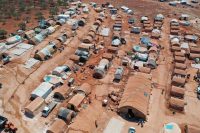The most likely nuclear scenario
With his forces retreating in Ukraine, international allies expressing concern and citizens at home fleeing partial mobilization, Russian President Vladimir Putin has reached for the threat of nuclear weapons – and revived Western fears of atomic apocalypse.
“The territorial integrity of our homeland, our independence and freedom will be ensured, I will emphasize this again, with all the means at our disposal”, Putin said in a speech last week. He added that “those who try to blackmail us with nuclear weapons should know that the prevailing winds can turn in their direction”.
So, how worried should we be? Here, former British army officer and former commander of the UK & NATO Chemical, Biological, Radiological and Nuclear (CBRN) Forces, Hamish de Bretton-Gordon, explains the crucial differences between “tactical” and “strategic” weapons and why all-out nuclear war probably isn’t on the cards anytime soon.… Seguir leyendo »



